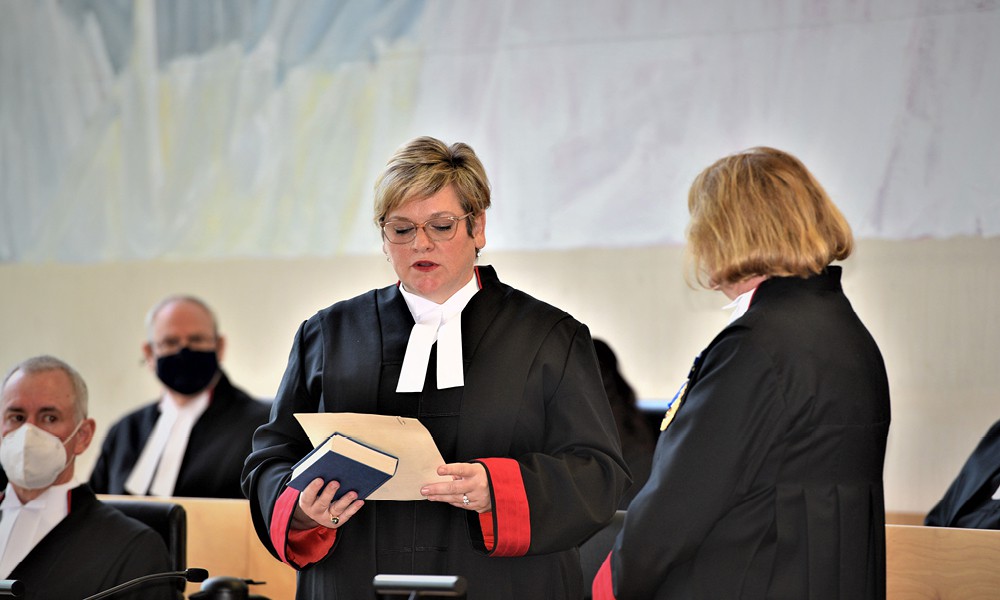“Just say what you have to say and then stop. Don’t labour it so much.”
– Belgarath the Sorcerer, Castle of Wizardry, by David and Leigh Eddings.
Back in high school one of my subjects was art, which I took in years 11 and 12 because I had a little bit of a feel for it and because I was enthusiastically dodging anything maths-related.
I enjoyed it greatly, and one of the pieces I really had fun with was the image above, the painting I handed in for assessment on surrealism.
The piece has all the hallmarks (that is, faults) of a high school assessment work, especially the fact that it was created to a deadline and so I never got to re-do the sunglasses in the bottom corner with an airbrush (the school only had one, and getting time on it was an art in itself).
I was really quite proud of the sky and sunset, though, and did a lot of work on it. Indeed, towards the end of the assessment period my art teacher asked me what I was doing that day, and I said I was going to do more work on the sunset. She shook her head. “Don’t,” she said, “It is done; sometimes you have to know when to stop.”
I have been blessed with the teachers I have had in my life, including the art teacher who said that (Mrs Hargrave, and a big shout out and thank you to her here too). She was right, it was as good as I was going to get it, but that lesson actually served me well throughout life, and especially in the law. One of the hardest things about making submissions, cross-examining and arguing objections is exactly that – knowing when to stop.
All advocates can fall into the trap of talking too much, because we are so worried about leaving something out. The rule in Browne v Dunn1 haunts us, hovering in our peripheral legal awareness as we struggle to ensure that we did put our case to the witness, wring the most out of every objection and fulsomely state our client’s case to the learned bench. It doesn’t help if what we are actually doing is running at the mouth and sending said learned bench into the arms of Morpheus.
I have seen many an advocate bury the quality of their case in a deluge of repetition, and I guarantee you I have done it myself. Not saying too much is something at which we must constantly work – we would not do what we do if we didn’t love the sound of our own voice just a little bit, after all – and there is no secret recipe to getting it right. There are some tips that might help, though.
- Have a plan – Much courtroom verbosity comes from unstructured, freewheeling advocacy. If you have a plan, you will know what you are looking for in (for example) cross-examination; if a point is already in the evidence there is no need to chase it further. If you write your closing submissions out first, you will be much less likely to go on too long.
- Don’t belabour a point – Keep the opening quote in mind. I guarantee you the judge/magistrate/member heard you the first time, saying the same thing three times is no more convincing than saying it once.
- Don’t fight an objection more than once – You object, you argue the point, and the judge says you are wrong? Let it go. Repeating the point the judge already rejected will not change their mind; it is the quality of your argument that will win (or lose) the day, not the quantity.
- Avoid stunts – You are not doing law in an American TV drama; in the real world, stunts hurt your client’s case. For example, I was once waiting to do a plea for a client on social security fraud, and the entire callover was lawyers doing the same thing. A barrister jumped up and said his piece for his client, and then gestured to the back of the room and said something like, “Your Worship (this was a while back) my client is supported by his family, and his wife and infant son are in the back of the courtroom here today to be with him at this troubled time.” The magistrate went off, hammering the barrister for trying to make the magistrate look like an ogre (his Worship’s words) and hoping that emotion would affect the decision. Busy magistrates don’t need that.
- Be aware of the realities of the court – By this I mean have a thought about what else a judge/magistrate/member has to do that day. If there are 50 people behind you and the magistrate is trying to get through morning court and deal with other matters in the afternoon, they do not want War and Peace from you. Short, sharp, to the point.
- If you haven’t got anything to say, don’t say anything – Most often abused in the opportunity for re-examination. Just because you can say something doesn’t mean you should. If things sit well, take the Beatles’ advice and Let It Be.
- If you know what you want, ask for it – If you are doing a plea for a client, and you have a sentence in mind, start with that – don’t try to butter up the court beforehand. The court can then ask the questions it needs answered to get you there, and you can avoid telling the court things it doesn’t want to hear.
As will be obvious, all of the above goes back to preparation. Know your matter well enough and you will know what you need to say, and what you do not need to say. Having a plan – more preparation – will keep you from getting side-tracked. Also, always remember that if you cannot think of anything more to say, it probably means you should sit down.
Shane Budden is a Queensland Law Society ethics solicitor.
Note
1 Browne v Dunn 6 R. 67, H.L.













2 Responses
Best version of stop I have heard was the following – Barrister to witness ” did you see the accused bite the complainants ear ” Witness – no I did not” – Instead of stopping there the Barrister says “how can you say the accused was the person responsible then ” – Witness replies -“because I saw the accused spit the ear out of his mouth”
Batman doesn’t need shades while he’s sleeping?